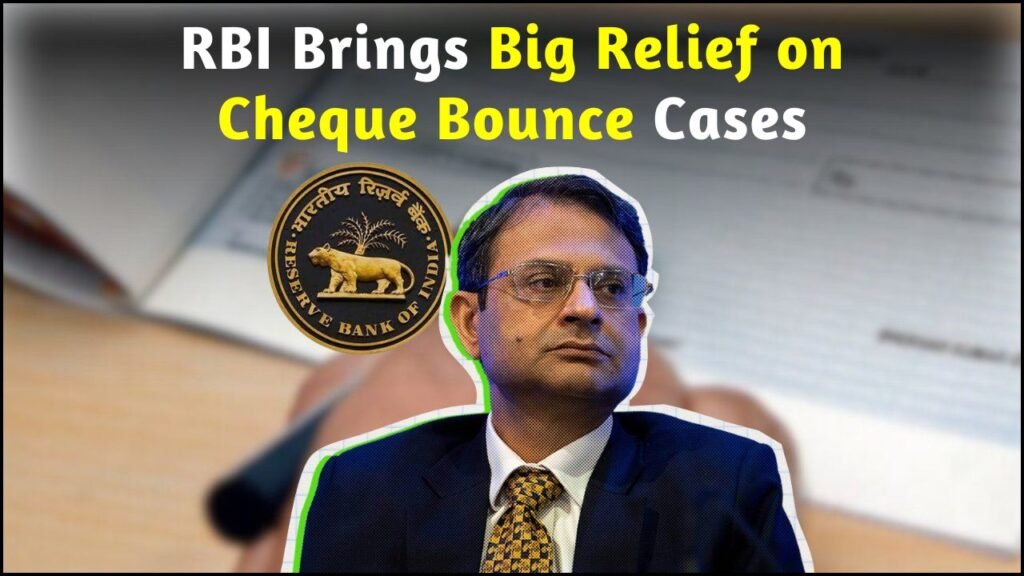
Cheque bounce cases have always been a headache—both for banks and customers. Even though digital payments are booming, cheques still play a role in business and personal transactions. But when a cheque bounces, it often leads to legal trouble, stress, and delays.
Now, the Reserve Bank of India (RBI) has stepped in with a fresh set of rules. These new guidelines are meant to make things smoother, faster, and fairer. Whether you’re a business owner, a salaried professional, or just someone who uses cheques once in a while, this is something you’ll want to know.
What is a Cheque Bounce Case?
A cheque bounce happens when a bank cannot process a cheque due to reasons like:
- Not enough money in the account
- Wrong signature
- Expired (stale) or post-dated cheque
- The account is closed
- Stop payment instructions from the issuer
This is not just a small mistake, it’s a criminal offense under Section 138 of the Negotiable Instruments Act, 1881. That means it can lead to legal action and even jail time. Still, many such cases get stuck in courts for years.
What’s New in RBI’s Cheque Bounce Guidelines?
The RBI has announced clear and strict measures to reduce misuse and delays. These rules aim to bring more discipline among cheque users and faster action for banks.
Highlights of the New Guidelines:
| New Guideline | What It Means |
|---|---|
| Quick Notification | Banks must inform customers within 24 hours via SMS or email if a cheque bounces. |
| Account Freeze Policy | Habitual defaulters will be marked in RBI’s internal system, and other banks will be alerted. |
| Standard Penalties | Penalty charges are now the same across all banks. No more confusion! |
| Red Flag Alert System | Habitual defaulters will be marked in RBI’s internal system and other banks will be alerted. |
| Cheque Book Ban Discouraged | Banks are now discouraged from banning cheque books completely for defaulters. |
Why This Matters to Customers and Businesses
These changes are designed to protect both sides—honest customers and banks.
Benefits for Customers:
- No more sudden penalties without notice
- Time to correct mistakes before facing serious action
- More transparency and better communication from banks
Benefits for Banks & NBFCs:
- Better tools to catch repeat offenders
- Lower legal and recovery costs
- Faster resolution and improved trust
Before vs. After: A Quick Comparison
| Aspect | Old Rules | New Rules (2025) |
|---|---|---|
| Notification | Delayed | Within 24 hours |
| Account Freeze | Rare | After 3 bounces |
| Penalty Charges | Varied | Standardized |
| Legal Process Time | 30–60 days | Under 30 days |
| Cheque Book Ban | Often permanent | Now discouraged |
| Red Flag System | Not available | Now active |
| Complaint Handling | In-person | Online portal added |
How Should Businesses Adjust?
If you’re running a business, especially one that still depends on cheque payments, here’s what you can do:
Smart Tips for Businesses:
- Keep records of all issued and received cheques
- Use digital payments wherever possible
- Train your staff about the new RBI rules
- Choose payment platforms that support cheque scanning
- Stay alert about bounced cheques and act quickly
Business Scenarios & New RBI Actions
| Situation | Old Action | New Action by RBI |
|---|---|---|
| First cheque bounce | Penalty + manual alert | Penalty + SMS/email alert |
| Repeated bounces (within 3 months) | Legal notice | Legal + account freeze |
| Cheque from closed account | Returned | Penalty + Red flag |
| Stop payment issued | Legal case filed | RBI promotes pre-legal mediation |
| Signature mismatch | Returned quietly | Return + alert to customer |
| Habitual offender | Case-by-case | Red flagged for all banks |
Is Cheque Bounce Still a Criminal Offense?
Yes, it is. The RBI has not removed the criminality of cheque bounce cases. Section 138 of the law still applies. However, the RBI wants banks to resolve issues early, without waiting for court action. Digital tools, faster notices, and red flag systems are now part of the process to fix problems early.
New Penalty Structure: Know the Charges
| Bounces | Penalty (₹) | Other Action |
|---|---|---|
| First | ₹150–₹300 | SMS/Email warning |
| Second | ₹300–₹500 | Red alert + warning |
| Third | ₹500–₹1000 | Temporary account freeze |
| Fourth & More | ₹1000+ | Red flag + legal escalation |
A Step Toward Smarter, Safer Banking
These new RBI rules are a much-needed update in the world of cheque payments. They focus on speed, fairness, and transparency. Whether you’re a customer or a business, it’s time to stay informed and adopt better practices.
This move is not just about punishing defaulters. It’s about building a more responsible banking culture where cheques are used wisely and fairly. Digital tools and clear processes are set to make cheque transactions safer than ever before.
Final Words
The RBI’s fresh rules are a big win for India’s banking system. They’re easy to follow, fair to all parties, and designed to reduce the overload in courts. Now, it’s up to us—customers, businesses, and banks—to play our part.
Stay alert, stay updated, and keep your cheques in check!

Mangesh Garg is a passionate writer known for captivating stories that blend imagination and reality. Inspired by travel, history, and everyday moments, He crafts narratives that resonate deeply with readers



